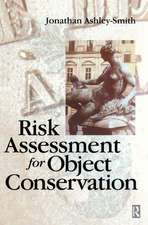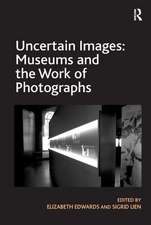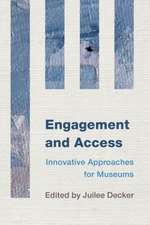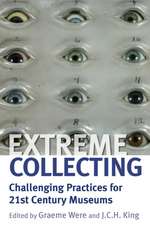Learning at the Museum Frontiers: Identity, Race and Power
Autor Viv Goldingen Limba Engleză Hardback – 6 aug 2009
| Toate formatele și edițiile | Preț | Express |
|---|---|---|
| Paperback (1) | 338.33 lei 6-8 săpt. | |
| Taylor & Francis – 19 oct 2016 | 338.33 lei 6-8 săpt. | |
| Hardback (1) | 767.20 lei 6-8 săpt. | |
| Taylor & Francis – 6 aug 2009 | 767.20 lei 6-8 săpt. |
Preț: 767.20 lei
Preț vechi: 1029.17 lei
-25% Nou
Puncte Express: 1151
Preț estimativ în valută:
146.80€ • 153.69$ • 121.47£
146.80€ • 153.69$ • 121.47£
Carte tipărită la comandă
Livrare economică 05-19 aprilie
Preluare comenzi: 021 569.72.76
Specificații
ISBN-13: 9780754646914
ISBN-10: 0754646912
Pagini: 246
Dimensiuni: 156 x 234 x 22 mm
Greutate: 0.62 kg
Ediția:1
Editura: Taylor & Francis
Colecția Routledge
Locul publicării:Oxford, United Kingdom
ISBN-10: 0754646912
Pagini: 246
Dimensiuni: 156 x 234 x 22 mm
Greutate: 0.62 kg
Ediția:1
Editura: Taylor & Francis
Colecția Routledge
Locul publicării:Oxford, United Kingdom
Notă biografică
Viv Golding is Lecturer in Communication and Education in the Department of Museum Studies at the University of Leicester, UK. Before entering academia on a full-time basis, she worked for ten years developing educational opportunities at the Horniman Museum in London and a further 12 years developing Arts Education Programmes in London.
Recenzii
'Viv Golding's Learning at the Museum Frontiers is a challenging feminist and post-modernist manifesto for tackling questions of race, difference and power in museums. It manages to be thoughtful and feisty, wide-ranging and positioned, clear and passionate. Containing a wealth of examples, it offers numerous ideas for making museums into spaces for new and even radical learning experiences.' Sharon Macdonald, University of Manchester, UK 'Dr. Golding adds significantly to critiques of traditional museum practice by providing rich descriptions of newer program and exhibition methods at selected museums that address racism and other social inequities. Employing a feminist-hermeneutic framework, she illustrates how museums can become "respectful dialogic spaces" addressing issues of power and control to support democracy.' George E. Hein, Lesley University, USA 'This new work by Viv Golding repositions in critical fashion the spatial politics of race, knowledge and truth in the museum and provides readers with an important advance in the creation of a critical museum pedagogy. This is an outstanding work, which combines theory with practice in an engaging and readable fashion and I highly recommend it to the field of education.' Peter McLaren, University of California, Los Angeles, USA 'Viv Golding, a leading museum educator, draws on a wide range of material for her analysis - from critical studies of 'race' and gender, to post-colonial discourse, and Black feminist theory. In keeping with the recent work of social geographers, 'Learning at the Museum Frontiers' examines concepts of space, place and knowledge in its discussion of access, learning and power. The resulting text combines recent theoretical critiques and understandings with best practice implementation in the realm of museum and gallery work to produce a pedagogy of museum education.' Ethnicity and Race in a Changing World: A Review Journal 'Golding draws on two decades of experience in arts educ
Cuprins
Preface, Eilean Hooper-Greenhill; Introduction: The Spatial Politics of the Museum Frontiers; Chapter 1 Race: Repositioning and Revaluing Cultural Heritage; Chapter 2 Space: The Museum and the New Spatial Politics of the Frontiers; Including New Voices and Forms of Practice; Chapter 3 Power: Inserting New Visibilities in the Museum Margins; Chapter 4 Control: Shifting Relationships in the Whole Museum; Critical Collaborative Museum Pedagogy; Chapter 5 Identity: Motivation and Self-esteem; Chapter 6 Towards a New Museum Pedagogy: Learning, Teaching and Impact; conclusion Conclusion: Pedagogy in Museums;
Descriere
In Learning at the Museum Frontiers, Viv Golding argues that the museum has the potential to function as a frontier, to tackle injustice and social exclusion, challenge racism, enhance knowledge and promote truth. The book offers an important theoretical and empirical contribution to the debate on the value of museums and what they can contribute to society.














